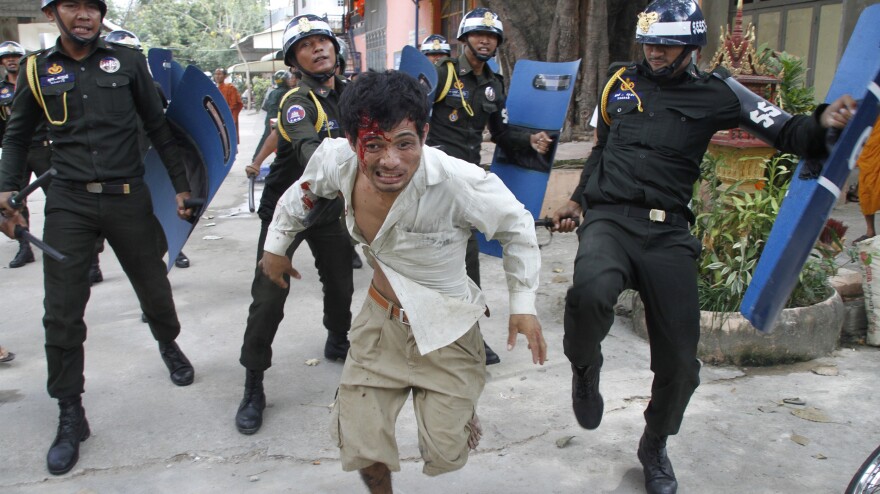Protesting garment workers and riot police clashed Tuesday in Cambodia's capital city, leaving a bystander dead and at least 20 people injured.
Workers from SL Garment Processing (Cambodia) Ltd. Factory were marching toward Prime Minister Hun Sen's residence in Phnom Penh. Workers from the factory have been protesting for months, demanding better pay and working conditions. The factory makes clothes for H&M, Gap and other Western brands.
Riot police were sent to block Tuesday's march. The clashes began when protesters surrounded five police officers sent to negotiate with them. The Associated Press reports:
"It was unclear which side started the attacks, which included police firing live bullets and tear gas to rescue their colleagues, and protesters throwing rocks and wielding iron bars and wooden sticks, Chan Soveth [senior investigator for the rights group Adhoc] said.
"A woman selling rice near the protest was killed by a police bullet, Chan Soveth and Am Sam Ath of the rights group Licadho said."
Six protesters were wounded, along with nine members of the public. Five Buddhist monks were also injured when police fired tear gas into a pagoda where protesters had sought refuge.
"The crackdown conducted by police this morning against workers was very cruel and unacceptable," Kong Athith, a spokesman for the Coalition of Cambodian Apparel Workers Democratic Union, which organized the protest, told the AP. "Workers were unarmed. Why did police use live ammunition to crack down on them?"
Cambodia's garment industry is one of the world's largest. It employs about half-million people in 500 shoe and garment factories. Many of these factories are foreign-owned, including SL Garment Processing, which is Singapore-owned.
The sector is Cambodia's biggest export earner, accounting for about 80 percent of all exports. Last year, it shipped more than $4 billion worth of garments and textiles to the rest of the world. But the industry is rife with complaints about pay and working conditions. As we reported in July, a report from the U.N.'s International Labor Organization said compliance on key workplace conditions, including fire safety, child labor and worker safety and health — in Cambodia need to be improved. And in September, the ILO said it would resume a practice of naming and shaming those factories that violate Cambodian law.
The clashes in Cambodia come amid increased scrutiny of garment factories in Asia.
The collapse of the Rana Plaza in Bangladesh in April killed more than 1,000 people. The collapse revealed the working conditions at factories in the world's No. 2 garment-making country after China. The incident was the worst in the global garment industry's history.
Since then, workers in Bangladesh have also protested for better pay and working conditions. On Tuesday, clashes between workers and police resulted in more than 50 injuries as police reportedly fired tear gas and rubber bullets at the protesters near the capital, Dhaka. Here's more from DPA, the German news agency:
"Workers have been demanding a minimum monthly salary of 5,300 taka ($66), as proposed by a government-appointed panel set up to review conditions after more than 1,100 workers died in a factory collapse in April.
"Factory owners have countered with a proposal of around $55, up from the current $39 minimum monthly wage for an entry-level factory worker, which the workers have rejected."
Copyright 2021 NPR. To see more, visit https://www.npr.org.



